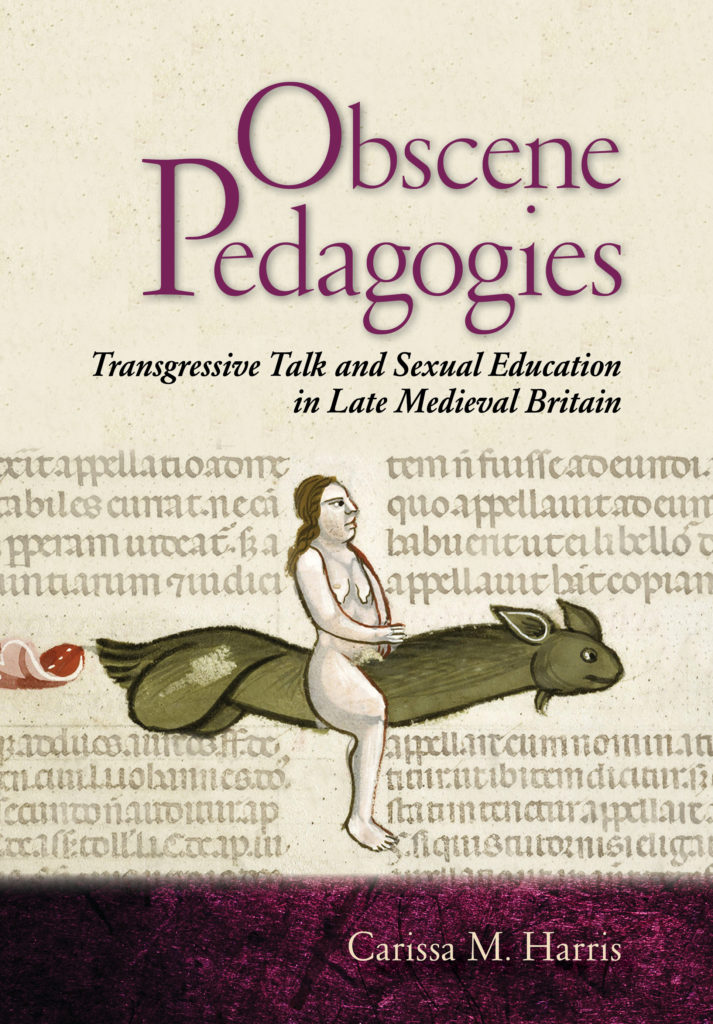Carissa Harris
As anyone who has read Chaucer’s Canterbury Tales knows, Middle English literature is rife with sexually explicit language and situations. Less canonical works can be even more brazen in describing illicit acts of sexual activity and sexual violence. Such scenes and language were not, however, included exclusively for titillation. In Obscene Pedagogies: Transgressive Talk and Sexual Education in Late Medieval Britain, Carissa Harris argues instead for obscenity’s usefulness in sexual education.

NOTCHES: In a few sentences, what is your book about? Why will people want to read your book?
Carissa Harris: My book explores medieval and contemporary rape cultures, obscenity, sexual education practices, and ideas about pleasure and consent through an intersectional feminist lens. It focuses especially on how obscenity can build same-sex educational communities, teaching groups of men about power and predation and groups of women about pleasure and danger. I think that people will be especially drawn to it in the context of the #MeToo movement. I first submitted my book to the press six months before #MeToo started. I was honestly kind of dismissive of the movement at first, and I still question whether it’s had a true, deep-seated social impact in the wake of the Kavanaugh hearings, but I appreciate that it has brought sexual violence into the public conversation and convinced many people that it’s a problem.
NOTCHES: What drew you to this topic, and what are the questions do you still have?
CH: I started doing activism and volunteer work around issues of sexual violence, intimate partner violence, and reproductive rights in college, and I’ve continued that work since then. I always viewed my activism and my academic work as separate, so it’s been a pleasure to combine the two. The questions I still have mainly revolve around rape resistance and how individuals and cultures can best resist rape and seek justice for sexual violence.
NOTCHES: This book is clearly about the history of sex and sexuality, but what other themes does it speak to?
CH: My book examines the history of sexually obscene words, with a fun history of the word “pussy” in its conclusion. It also focuses on resonances between medieval and contemporary rape cultures.
NOTCHES: How did you research the book? What sources did you use? Were there any especially exciting discoveries, or any particular challenges?
CH: I spent a lot of time with medieval manuscripts while researching this book. When this book was a dissertation about medieval obscenity (without the education or sexual violence components), I realized that many of the printed editions of medieval lyrics contain lines that were omitted by Victorian editors due to their obscenity. The manuscripts were a useful way of recovering the obscenities that had been omitted from print, and they were also a rich source for seeing how obscenities had been crossed out, embellished, or replaced by medieval readers. These details about reader responses to obscenity often don’t make it into print editions.
This was not an easy book to write. Writing about rape takes a toll on one’s spirit, and I developed vicious insomnia during the writing process because I couldn’t stop thinking about the book. I had to read a lot of awful news stories and graphic accounts of sexual violence. For example, my conclusion contains a page or so on the University of Minnesota’s 2016 football team gang rape case, but I had to read the university’s 80-page Title IX investigative report on the case in order to research that section, and it was probably the most brutal thing that I’ve ever read. So I’d place my hands in front of me on either side of my computer keyboard while I was reading the .pdf, and once I noticed my hands starting to shake, that was my cue to take a break. I had to be very vigilant with my self care while writing this book. I went to spin class religiously to provide an outlet for my anger and frustration, took lots of walks to clear my head, and watched a lot of terrible reality television (all the Real Housewives, Vanderpump Rules, Southern Charm, Teen Mom) to give my soul a break. And I ate a lot of lentils, which are my personal power food.
NOTCHES: Whose stories or what topics were left out of your book and why? What would you include had you been able to?
CH: I had a lot more to say about intoxication and consent than I was able to include in the book, so that material became a separate article coming out in Medieval Feminist Forum this winter. I could’ve written the whole book about medieval pastourelles, so a lot of that extra material shows up in an essay collection on the pastourelle that I’m co-editing. And I had a lot of extra material about the history of “fuck” and “swyve” that was causing my first chapter to balloon out of control, so that’s a separate article forthcoming from Studies in the Age of Chaucer next year. I have a lot more to say about sexual violence, and I love writing about it even though it’s emotionally difficult, so I’d like to return to that topic in the future, perhaps in the form of a more public-facing book.
NOTCHES: Did the book shift significantly from the time you first conceptualized it?
CH: Yes. My dissertation focused on obscenity, but it didn’t have the education or sexual violence components that the book has. During my final feverish summer of dissertation-writing, I had to gut and revise my Chaucer chapter to focus on obscenity and masculine community in the Reeve’s Tale. I kept seeing links between the Canterbury Tales’ fictional toxic brotherhood and communities of men whom I had known in high school and college, and realized that the book would have to focus on sexual violence.
NOTCHES: How did you become interested in the history of sexuality?
CH: I was always interested in sexuality and sexual violence throughout history, going back to when I was a kid reading Bible stories about the rape of Dinah in Genesis and the gang rape of the Levite’s concubine in Judges. I had a strict evangelical upbringing, and was always intrigued by sexuality because it was largely a taboo topic. I wanted to learn everything that was deemed “off-limits.” This was in the heyday of the “True Love Waits” abstinence movement and the “I Kissed Dating Goodbye” courtship movement, so the only stories I heard about sexuality were all about premarital sex’s devastating consequences.
NOTCHES: How do you see your book being most effectively used in the classroom? What would you assign it with?
CH: My book would be useful for upper-level undergraduate classes on rape culture, medieval masculinities, or medieval sexuality. I tried to write it as clearly and accessibly as possible, and I translated most of the Middle English and all of the Middle Scots quotations so that the book would make sense to people who don’t specialize in medieval literature. I included two appendices of medieval lyrics that I edited and glossed specifically for classroom use, and I tested them by teaching them in my medieval sexualities undergraduate seminar last spring and soliciting my students’ feedback.
NOTCHES: Why does this history matter today?
CH: The Middle Ages has fundamentally shaped how we view sexuality today. I started writing the book in earnest right when Elliot Rodger shot a bunch of people in Isla Vista in May 2014. I read his 141-page “manifesto” (which I do not recommend) about how his violence was sparked by his sense of thwarted sexual entitlement, and I saw how closely his sentiments matched the attitudes expressed by rapists in medieval pastourelles. It made me so angry and so devastated to see how little has changed and how these attitudes still wreak such violence and harm, so I just started writing. We like to think that we’re so much more progressive than medieval people when it comes to sexuality, but I hope my book shows that we still have a lot of work to do, and I hope it inspires people to do that difficult work of rethinking power, pleasure, and consent.
NOTCHES: Your book is published, what next?
CH: I’m working on a few essays about female friendship, resisting rape, women’s emotions in Middle English female-voiced songs, and obscene genital terms in a manuscript owned by nuns. I’m editing a collection of nineteen medieval pastourelles and rape songs for a volume of essays titled Subjects of Violence: Women, Consent, and Resistance in the Late Middle Ages that I’m co-editing with two friends. Writing about rape and misogyny and seeing how little had changed over time made me very angry, so I’m using that anger as fuel for the beginning stages of my next book, The Poetics of Rage: Women’s Anger, Misogyny, and Political Power, 1300-1600. In the future, I’d like to do more public-facing work and maybe publish a book of creative nonfiction.
 Carissa Harris is Assistant Professor of English at Temple University. She received her B.A. in English and Women’s and Gender Studies at Washington University in St. Louis and her Ph.D. in English literature, with a focus on medieval studies, from Northwestern University. She loves cats, people watching, and reality television. Obscene Pedagogies is her first book.
Carissa Harris is Assistant Professor of English at Temple University. She received her B.A. in English and Women’s and Gender Studies at Washington University in St. Louis and her Ph.D. in English literature, with a focus on medieval studies, from Northwestern University. She loves cats, people watching, and reality television. Obscene Pedagogies is her first book.

NOTCHES: (re)marks on the history of sexuality is licensed under a Creative Commons Attribution-NonCommercial-NoDerivatives 4.0 International License.
Based on a work at www.notchesblog.com.
For permission to publish any NOTCHES post in whole or in part please contact the editors at NotchesBlog@gmail.com




